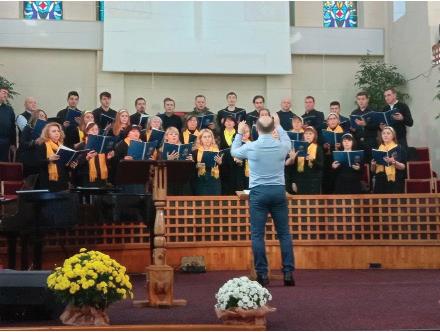
11 minute read
The Choral Community in Ukraine
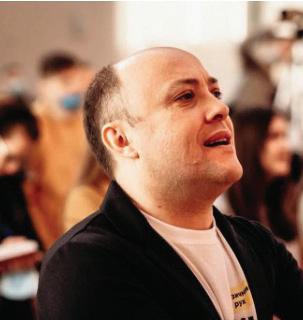
BY VITALIY BOLGAR
TRANSLATED BY NATALIYA BOLGAR, COMPILED BY AMY FARNELL
The Church always plays an important role in society, but especially in wartime. Before the war started in Ukraine in 2022, there was a lot of information around the world that there could be a war, but people did not believe that it would be possible in Ukraine, which chose independence 30 years ago. Honestly, I also could not allow the thought that there would be a war in Ukraine on such a scale as it is today. On the morning of February 24, 2022, the entire country of Ukraine, as well as my family, was awakened by the terrible explosions of shells and air-raid sirens. From that very moment, our lives were divided into ‘Before’ and ‘After’ –‘Before February 24’ and ‘After February 24’. Since Ukrainians are, culturally, a very hospitable people, I knew that whoever I called that morning asking for shelter would have welcomed me and my family. Everyone thought the same way I did at the time of the war, however, and lots of the people began to quickly leave their apartments, houses, and cities.
Many people, though, remained where they were and continued serving in the church. Before February 24, some churches gave their parishioners information in case of war: Some churches in Kyiv were buying generators, fuel, and food, and gave masterclasses on how to give first aid to the victims. Of course, these were only a few churches, but they started working smoothly from the day the war started, since they had experience receiving displaced Ukrainians in 2014 who were fleeing the war in the east that Russia started.
People in the neighborhoods immediately started looking for help, and where do you think they went? To the church they knew that was in their neighborhood. Churches were engaged in evacuation from the captured areas, churches distributed and gave out food, churches served as a bomb shelters, churches served as ‘warm banks’ where people could go to get warm while their heating was cut off, churches served as laundromats and charging stations for the electronics, and certainly churches shared with everyone who came to them words of hope. Such ministries continues to this day – many unbelievers have already repented, accepted the Lord as their personal Savior, and been baptized. This year there were more baptisms by churches than in the last 2 years combined, showing that the church became a point of physical and spiritual refuge during the war.
However, there are also of course destructive realities to this war. More than 400 church buildings throughout Ukraine (2 of them in the Kiev region) have suffered from Russian shelling. Some church’s ministers left Ukraine near the start of the war, 30 left in the Kiev region. Some churches, of course, were left without any leadership team, and there are churches that simply have ceased to exist. Others will not be able to recover due to the fact that their village or town has been completely destroyed by Russian bombs.
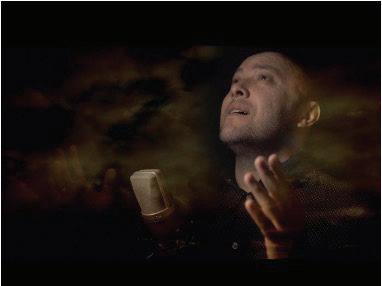
Constant anxiety, worry, and instability greatly depresses everyone, including me; but a certain psychological defense for survival is probably developed and this is how we live. Of course, from time to time I am overwhelmed by despondency and uncertainty about what will happen next. How is it going to be? What do we need to be prepared for in order to survive? How do I save my life and protect my family? How do I stay faithful to God and stay with the people of Ukraine in this difficult time? Most of these questions stay unanswered... I have to look for strength – physical, emotional, spiritual and psychological –to be in fasting and prayer, to lead others and ultimately to direct their attention to God. I know that spiritual stability and physical strength can only be found in God, but everything we see, hear, and feel in Ukraine hurts our hearts very much and this wound of war will remain as a scar for life.
Before the war, there were 11 adult choirs and four children’s choirs representing evangelical churches in Kyiv. Since the war started the number plummeted to a mere five adult choirs and one children’s choir. Since I have been engaged in music for most of my life, I have friends in each of the regional centers of Ukraine. There are many of my friends who left at the start of the war for Europe, USA, and Australia. I had been leading a combined young adults choir whose members were from 10 churches in Kyiv, but due to the war, 60% of this choir are now scattered across Europe and the USA. In our chat we regularly support each other and pray for one other. Of course, I realize that we will never be able to gather as a pre-war group of singers, but we will support one another as much as possible. This year the choir would have celebrated its 20-year anniversary. I am not in every chat of all the choirs in Kyiv; however, I know that many churches keep in touch almost daily with their choir members, as well their church members. I also know that every church sincerely hopes that as soon as the war is over that many will return back to Ukraine, to their churches, and they will be together again.
I stay in Ukraine because of the main calling in my life – serving God and people – even though the prospects of what will happen next to my country are as foggy as they could get. I know that people will never appreciate what I have to sacrifice while remaining in Ukraine at the time of war: I am not close to my family, I cannot hug my son and wife every day, and it is emotionally difficult... but I know and believe that God knows and sees everything and in due time He will fill this gap in our life.
And God has surely been with us –several young people joined our church choir since the start of the war. I also know that many people who claimed to be indifferent or atheist, started attending a church since the start of the war. People want to listen to the word of God. People are ready to go to church, profess Jesus as their Lord and Savior and get baptized. And, interestingly enough, no one stopped coming to the choir rehearsals, except for a few choir members who have been drafted at the start of the war and continue to serve in the Ukrainian army. During the first two months of the war, there were no choir rehearsals at all, but in the third month, the churches, one after another, started having choir rehearsals.
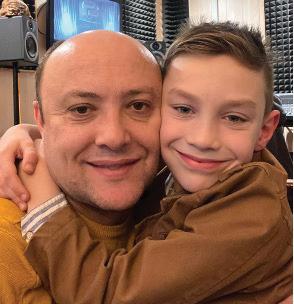
The choir of the church I attend has a two-hour choir rehearsal, once a week. However, each choir member makes a great effort to get to the rehearsal: in the evenings the street lights are off, therefore, one needs to be extremely vigilant when he walks down the street. During the summer it was easier because the daylight hours are longer; in autumn and winter it is much more difficult since it gets dark earlier, and it is not safe to be outside without personal lighting. Therefore, each choir member has purchased a small flashlight to use in the dark when walking outside. This has also been helpful in the choir room, to shed light on the music we are rehearsing, when electricity is off in the building.
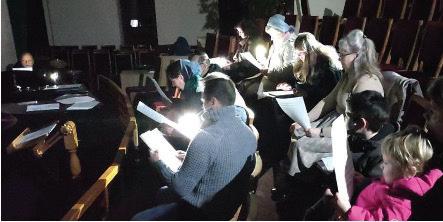
In general, singing individually and collectively gives a lot of strength for surviving crisis moments in the life of a Christian, the church, the city and the country we live in. As Christians, we must encourage the body of believers with a song, so that the Church (the people) can impact the world for God’s kingdom. Encouraging each choir member to sing is what the Levites (singers) can do in this difficult wartime. Paul and Silas prayed and sang hymns to God when they were in prison (Acts 16:25). We also have such an opportunity to sing in the ‘dark’, literally and figuratively. The choir members are encouraged to learn and memorize the songs so that when the lights are turned off in the building, they can continue to sing them by heart.
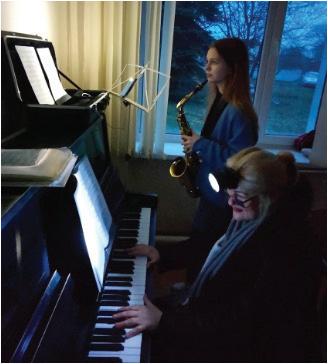
Every choir member is an ordinary person, a regular worker, who earns his or her living outside of the music field. The people who sing in my church choir: a soldier who is serving as a national guard since the start of the war (he also sang in the choir before the war), a crisis psychologist, an assistant judge, a hairdresser, a housewife, a medical rehabilitologist, a truck driver, several young students who did not leave Ukraine, and others… They are all united by a desire to serve and glorify God. Of course I would like to have more singers; Regrettably, there are not enough young female singers, and this has been a problem. Many of them have left the country due to the war, but we are learning to work with what we have and who we have. I am grateful for the commitment of each choir member to serve the Lord in times like this. And I am happy to report that, so far, in our choir, God has protected those who are on the battlefield and their families. We pray hard and earnestly that everyone will return home alive from the frontline.
In regard to the selection of songs for the choir: the songs we sing are prayerful, gratitude, introspective, soulful, heartfelt, and have a message of hope. Before the war, the repertoire was of an exclamatory and powerful nature; now the heart longs for prayerful songs, but I try to listen to the needs of the choir, the church, and the community. We, as Christians, want to support our country, the military, the people, and inspire them to pray more for God to send everything necessary to stop this war. In my humble opinion, there is a great awakening happening now among ordinary people in Ukraine. In some regions, the church followed God’s command of helping people – to be the salt and the light. We need leaders and missionaries especially in the eastern part of our country. A lot of humanitarian aid is brought in by various Christian organizations and people are willing to go to church, but there are no leaders to lead them, so I organize prayer meetings online to support such people.
I am the Ukrainian representative of the global non-profit Music in World Cultures (MIWC), and director of the Eurasian Music Mission (EMM), two organizations which have been working in partnership since 1999. The main purposes of these organizations are to train young generations of musicians to serve in the local churches, organize and lead children music camps, and organize music seminars and conferences. However, due to the circumstances in Ukraine since February 24, 2022, we were forced to pivot in our ministry directions, now focusing on humanitarian ministries in the regions affected by the war: assisting with evacuation, providing food boxes, and medical care (photo is of one of our teams, geared to enter the front line in combat-readiness to distribute food boxes, medicines, and survival items for the months of winter). The preparation and management of these three ministry areas can only function effectively with an immense amount of time, manpower, and financial support.
If anyone would like to partner with us in helping the ministries we are doing in Ukraine during the time of war, we will be forever grateful. You can go to the MIWC website where you can learn more about the ministries we are involved in. There you can also send financial support to the needs and requests of the Ukrainian people who survive the war by clicking “Donate” for MIWC Eastern Europe. Many people, after receiving our assistance, start coming to church, listen to the Word of God, and find Him as their personal Lord and Savior. What a great opportunity to touch people’s lives and make a difference for eternity!

Vitaliy Bolgar (b.1980) is a fourth-generation Ukrainian Christian, married to his beautiful wife, Lyudmila, together raising their son, 8-year-old Julian. The family also has an adorable 3-year-old Cocker Spaniel by the name of Spanky. Vitaliy is a choir and orchestra conductor, and a vocalist. His hobbies include playing soccer, fishing, and having fun with family.





